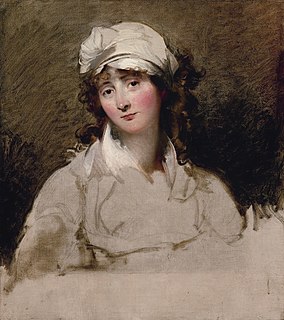A Quote by Elizabeth Inchbald
Tears from our sex are not always the results of grief; they are frequently no more than little sympathetic tributes which we pay to our fellow-beings, while the mind and the heart are steeled against the weakness which our eyes indicate.
Related Quotes
There are those, however, that are not frightened of grief: dropping deep into the sorrow, they find therein a necessary elixir to the numbness. When they encounter one another, when they press their foreheads against the bark of a centuries-old tree...their eyes well with tears that fall easily to the ground. The soil needs this water. Grief is but a gate, and our tears a kind of key opening a place of wonder thats been locked away. Suddenly we notice a sustaining resonance between the drumming heart within our chest and the pulse rising from the ground
Perhaps if there were more of that intense distress for souls that leads to tears, we should more frequently see the results we desire. Sometimes it may be that while we are complaining of the hardness of the hearts of those we are seeking to benefit, the hardness of our own hearts and our feeble apprehension of the solemn reality of eternal things may be the true cause of our want of success.
The human heart is the first home of democracy. It is where we embrace our questions: Can we be equitable? Can we be generous? Can we listen with our whole beings, not just our minds, and offer our attention rather than our opinion? And do we have enough resolve in our hearts to act courageously, relentlessly, without giving up, trusting our fellow citizens to join us in our determined pursuit-a living democracy?
Confronting our feelings and giving them appropriate expression always takes strength, not weakness. It takes strength to acknowledge our anger, and sometimes more strength yet to curb the aggressive urges anger may bring and to channel them into nonviolent outlets. It takes strength to face our sadness and to grieve and to let our grief and our anger flow in tears when they need to. It takes strength to talk about our feelings and to reach out for help and comfort when we need it.
Does the open wound in another's breast soften the pain of the gaping wound in our own? Or does the blood which is welling from another man's side staunch that which is pouring from our own? Does the general anguish of our fellow creatures lessen our own private and particular anguish? No, no, each suffers on his own account, each struggles with his own grief, each sheds his own tears.
In a world in which we are exposed to more information, more options, more philosophies, more perspectives than ever before, in which we must choose the values by which we will live (rather than unquestioningly follow some tradition for no better reason than that our own parents did), we need to be willing to stand on our own judgment and trust our own intelligence-to look at the world through our own eyes-to chart our course and think through how to achieve the future we want, to commit ourselves to continuous questioning and learning-to be, in a word, self-responsible.
Why are we such tortured human beings, with tears in our eyes and false laughter on our lips? If you could walk alone among those hills or in the woods or along the long, white, bleached sands, in that solitude you would know what meditation is. The ecstasy of solitude comes when you are not frightened to be alone no longer belonging to the world or attached to anything. Then, like that dawn that came up this morning, it comes silently, and makes a golden path in the very stillness, which was at the beginning, which is now, and which will be always there.
A life without a lonely place, that is, a life without a quiet center, easily becomes destructive. When we cling to the results of our actions as our only way of self-identifiction, then we become possessive and defensive and tend to look at our fellow human beings more as enemies to be kept at a distance than as friends with whom we share the gifts of life.
The religion of our fathers overhung us children like the shadow of a mighty tree against the trunk of which we rested, while we looked up in wonder through the great boughs that half hid and half revealed the sky. Some of the boughs were already decaying, so that perhaps we began to see a little more of the sky than our elders; but the tree was sound at its heart.






































